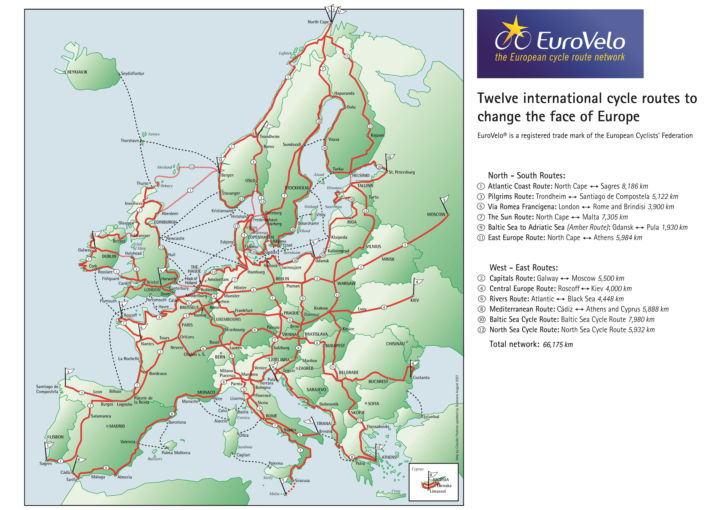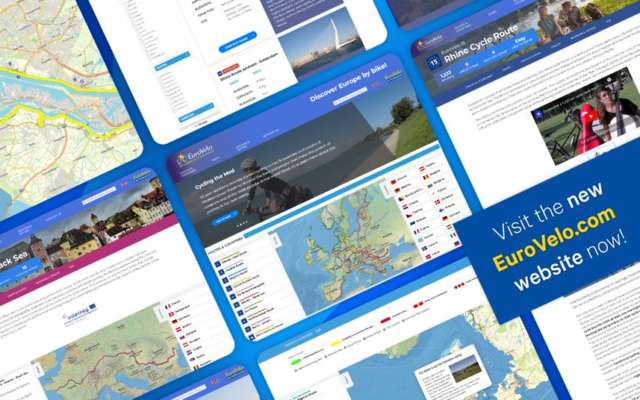History ofEuroVelo
1993
- Opening of the Danish national cycle route network, one of the inspirations for EuroVelo.
1994
- First discussions on the idea of establishing a European cycle route network. Jens Erik Larsen from Foreningen Frie Fugle, Denmark, starts to work on a proposal.
1995
- A Conference on National Cycle Route Networks, organised in Amertsfort, Netherlands on 22 February brings together for the first time many of the figures that would play a leading role in the creation of EuroVelo.
- A working group within the European Cyclists’ Federation (ECF) is being established during the AGM in Brussels (9th-11th June 1995) to look into creating a European cycle route network. The first meeting of this working group takes place in Cheb, Czechia, on 15 September and is chaired by Jens Erik Larsen. The other members of the working group are Rein Lepik (Vänta Aga, Estonia), Chris Heymans (SLF, Norway), Richard König (ADFC, Germany) and Martin Robes (Czech and Slovak Trafic Club, Czech Republic).
- Following the meeting in Cheb, an initial map showing proposals for 12 European cycle routes is prepared.
1996
- On 10-11 May 1996, a conference on long-distance cycle routes is being held in Bruges, Belgium. Jens Erik gives a presentation on "Possibilities for further development of the European Cycle Route network".”
- At a meeting in Brussels in September, Jens Erik and Chris Heymans are joined by Phil Insall (Sustrans, UK), Marie Caroline (ECF) and Joaquin Jimenez (Spain) to prepare the EuroVelo map and logo to be presented at a launch event planned for 1997. Both the map and logo are drawn by Claudio Pedroni of FIAB, Italy.
1997
- An application is submitted to the European Commission (EC) for funding for the EuroVelo project. As part of the application, contributions are sought for match funding from many organizations, which helped in raising awareness about the network. The application is successful and it enables a lot of work to be done on developing EuroVelo over the coming years (see 1998).
- On 21 November, the EuroVelo project is officially ‘launched’ in Logroño, Spain. Robert Coleman, Director of Transport at the European Commission, gives a speech saying: “International cycle tourism is already an economic force, and there is significant untapped potential here which could be released by an effective marketing strategy”.

1998
- ECF, Sustrans and Foreningen Frie Fugle sign a contract for the management of the project. The foreseen work includes regular communication about the project (e.g. printed newsletters); the preparation of a business plan for EuroVelo; various manuals related to organisation and route development; and feasibility studies for each route. The feasibility studies are carried out by various consultancies.
- The first printed manual about the development and background of EuroVelo is published in June.
1999
- The first EuroVelo Newsletter is published in the spring. A second grant is received from the EC (DGVII Transport) to continue developing the EuroVelo network.
2001
- ‘Opening’ of the first EuroVelo route: EuroVelo 12 - North Sea Cycle Route.
2002
- Publication of the first EuroVelo Guidelines.
2006
- As part of an Interreg project focused on EuroVelo 6 – Atlantic-Black Sea, a new logo is created for the EuroVelo network.
2007
- In August 2007, Sustrans and Foreningen Frie Fugle formally ‘give’ the project over to ECF and the EuroVelo Council is being established as an advisory group for the ECF Board on EuroVelo matters.
2009
- The European Parliament asks: “…the Commission and the Member States to consider the EuroVelo Network and in particular EuroVelo 13 - Iron Curtain Trail as an opportunity for promoting European trans-border cycling infrastructure networks, supporting soft mobility and sustainable tourism.”
2010
- On 31 May 2010, the UNECE WP.1 (United Nations Economic and Social Council, Working party on road safety and signalisation) incorporates the signing of the EuroVelo routes into the Consolidated Resolution on Road Signs and Signals (R.E.2).
2011
- An EC-supported project enables the creation of the EuroVelo website for professionals working on the development of the network.
- In September, two new routes join the network: EuroVelo 13 – Iron Curtain Trail and EuroVelo 15 – Rhine Cycle Route at an event in the European Parliament.
- On 15 December, the European Parliament explicitly asks for EuroVelo to be included in the Trans-European Transport Network (TEN-T) in their response to the European Commission’s White Paper on Transport. The motion states “EuroVelo, the European long-distance cycle route network, should be included in the TEN-T network.”
2012
- Another successful application of ECF enables the development of EuroVelo.com – the website for people wishing to cycle the routes – and a new EuroVelo Overview Map.
- ECF and European Greenways Association (EGWA) host their first-ever Joint Conference on EuroVelo, Greenways and Cycle Tourism in Nantes, France.
2013
- Over 40 representatives attend the Annual National EuroVelo Coordination Centres and Coordinators meeting in Vienna – a record figure.
2014
- References to EuroVelo and cycling generally are added to the TEN-T Guidelines for the first time ever following an extensive lobbying campaign by ECF, its members and other supporters.
- EuroVelo, Greenways and Cycling Tourism Conference 2014 is held in Basel, Switzerland.
- EuroVelo 15 – Rhine Cycle Route becomes the first EuroVelo route to be certified as meeting the requirement of the European Certification Standard’s methodology.
2015
- All EU Transport Ministers sign the Declaration of Luxembourg (Declaration on Cycling as a climate friendly Transport Mode).
- First Long-Term-Management Agreement (LTMA) launched on EuroVelo 15 – Rhine Cycle Route, as a deliverable on the EU project DEMMARAGE. LTMAs are later renamed as EuroVelo Route Partnership focusing on transnational coordination and activities dedicated to a specific EuroVelo route.
2016
- EuroVelo, Greenways and Cycling Tourism Conference 2016 is held in Vienna, Austria.
- Rhone Cycle Route joins the EuroVelo network with the number 17. A major extension to EuroVelo 1 - Atlantic Coast Route in Portugal is also approved.
2018
- EuroVelo & Cycling Tourism Conference 2018 is held in Limburg, Belgium.
- ECF is a partner in three Interreg projects related to EuroVelo routes: AtlanticOnBike (EuroVelo 1 - Atlantic Coast Route); MEDCYCLETOUR (EuroVelo 8 - Mediterranean Route) and Biking South Baltic! (EuroVelo 10 - Baltic Sea Cycle Route).
2019
- EuroVelo 19 - Meuse Cycle Route joins the network.
- Major extension to EuroVelo 8 - Mediterranean Route in Izmir, Türkiye approved.
- A Cycling Tourism Day is organised during ITB Berlin.
- EuroVelo 13 – Iron Curtain Trail is certified as a Cultural Route of the Council of Europe.
- Launch of the redesigned EuroVelo.com web platform.

2020
- A new EuroVelo Strategy 2030 and new EuroVelo Governance are adopted by the ECF Board.
- EuroVelo 14 – Waters of Central Europe joins the network.
2021
- The EuroVelo Data Hub is launched, gathering different reports and data sources: EuroVelo Route Development Status Report, improving the knowledge on the network thanks to GPS data collected by ECF via NECCs; Usage monitoring data published through a partnership with Eco-Counter; Digital statistic reports published based on EuroVelo communication outlets.
- Two new EuroVelo Partnerships are signed: one on EuroVelo 1 – Atlantic Coast Route, and one on EuroVelo 8 – Mediterranean Route.
- The first-ever EuroVelo General Meeting (EVGM) is held in Barcelona the day before the largest EuroVelo & Cycling Tourism Conference to date, which attracts over 300 participants in person and online.
2022
- Launch of the EuroVelo GPX track download feature on EuroVelo.com.
- The EVGM is held in Ljubljana with the highest number of participants ever.
- A EuroVelo Partnership to promote EuroVelo 19 – Meuse Cycle Route is signed.
- EuroVelo celebrates its 25th birthday with an online event on 21 November and 500+ registered participants.
2023
- The fourth edition of the EuroVelo Overview Map is published, the extension of EuroVelo 14 to Debrecen (Hungary) and the extension of EuroVelo 3 to Cape Fisterra (Spain) are launched at ITB in Berlin.
- EuroVelo is included in the European Parliament Resolution on a EU Cycling Strategy.
- Launch of the EuroVelo route planner on EuroVelo.com.
- The EuroVelo & Cycling Tourism Conference is held in Izmir (Türkiye) together with the annual EVGM, which again breaks all attendance records.
- ECF is a partner in two new Interreg-funded projects: ICTr, to develop EuroVelo 13 – Iron Curtain Trail, and Baltic Biking UPGRADE, focusing on EuroVelo 10 – Baltic Sea Cycle Route.